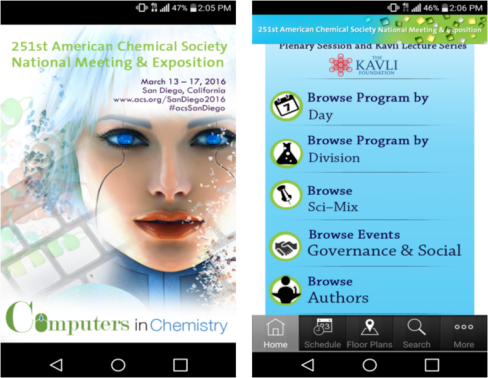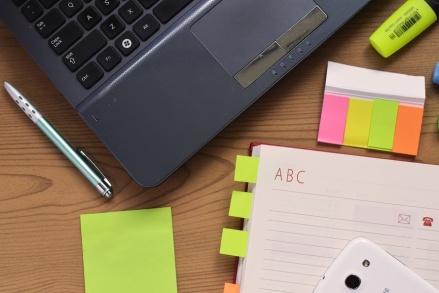Now that spring semester is coming to an end, a lot of scientists are getting ready to go to scientific conferences over the summer. During spring break I had the opportunity to participate in the American Chemical Society conference held in San Diego. This national conference attracts thousands of chemists from all over the country to spend five days learning about the latest information in their areas of professional interest and networking with colleagues. Moreover, this conference was particularly interesting to me as an undergrad student because it provides an opportunity for undergrads to present an oral or poster presentation on their research. Here’s a picture of me presenting the work that I did last summer with Dr. Vivian Feng as part of the Center for Sustainable Nanotechnology.

At the conference, I had a great time networking with other undergraduate chemistry students, meeting recruiters from graduate schools, and engaging in invaluable learning opportunities with many prominent professional chemists. However, a national conference like this could be overwhelming and intimidating for a first timer. There were many things that I wish I had known so that I could be more prepared and get the most out of such an intellectually stimulating professional development arena. In this blog post, I would like to share some of the tips that will help make your first professional conference a success whether you are an undergraduate, graduate, or just a curious science soul.
1) If a mobile app exists, download it
Many national conferences, such as the ACS national meetings, are accompanied with a mobile app that you can download on your. Figure 2 below shows the 2016 ACS mobile app with the theme of computers in chemistry. Having the app is particularly important so that you can get real-time updates of the conference (canceled presentations, location changes, etc.). You will also be able to see information and get ideas about which sessions you might want to attend. In addition, the app contains the conference map and floor plans of all buildings to help you navigate the chaos. This is important especially if it is your first time attending such a large conference where sessions and activities are held in different locations that can extend to several different hotels within a couple miles surrounding the main convention center. Thus, I highly recommend that you download the app prior to the conference to allow for some time to familiarize yourself with the features that it has available.

2) Develop your plan of attack (aka make a schedule)
Create a conference schedule to plan your personal itinerary including a day-by-day agenda. The app normally has a built-in scheduling feature if you prefer an electronic calendar. Having a schedule will allow you to prioritize or to balance sessions you “should” attend. Moreover, include alternatives with at least two sessions planned for every time slot. This is useful because your first choice might be over-capacity, off schedule, or it might not be as interesting or applicable to your research as you thought it would be. In this case, you can productively head to your alternative. In addition, there are keynote speakers that you likely won’t want to miss.
3) Diversify the symposia you attend
Try to attend a few sessions that are outside your areas of interest. This can provide you with an opportunity for networking as well as unexpected knowledge that you might gain from different perspectives. One of the most valuable symposia that I attended at ACS was the award talk from the Women Chemists Committee (WCC). Figure 3 shows the WCC Rising Stars awards recipients for 2016. I not only learned about awesome research from many successful female chemists, but also had the opportunity to learn about this committee. As a young female scientist, I felt encouraged to know that there was a supportive community whose mission is to attract, promote, and advocate for women in the chemical sciences in order to positively affect society and the profession.

4) Visit the exhibition areas
Aside from attending talks, you should try to check out the industrial exhibition halls to learn about new technologies and products. In addition, many companies give their products out for free. Freebies are of course one of the best conference bonuses for an undergraduate with minimal financial support.
5) Personal time is important
I would suggest that you do not completely pack your schedule with sessions. Include personal time in your schedule so you can relax and rejuvenate. Remember that you do not have to attend back to back sessions. The conference will be much more enjoyable if you are not sick and/or sleep deprived.
6) Take notes
Invest in a planner or notebook and always have it handy to jot down great ideas or information that you heard during a talk or poster session. You can also use the planner to write down your comments or questions to ask the speaker at the end of their presentation. Having a planner will provide a handy reference for articles, organizations, and people. Keep your planner safe because you will likely not remember many details three weeks after you attend the conference.

7) Network and contribute to the conversation
Don’t be afraid to talk to strangers. At a professional conference, most people you meet are going to be unbelievably friendly and helpful. Everyone is there to share what they know and to learn new things. Also, don’t be afraid to jump into the conversation if you have something to add. Remember that you have unique perspectives and experiences as well. Listen and learn all you can. Asking a lot of questions and showing your curiosity about others’ work might land you a research position for the coming summer or a job down the road.
8) Other essential items
There are several additional conference essentials that worked for me. First, always bring a refillable water bottle with you since there are usually water fountains for you to refill your bottle. Not only will this save you money on drinks at the conference, but also you are contributing to a greener environment by reducing waste! Second, remember to wear professional but also comfortable shoes because there may be significant walking involved back and forth in between sessions. Last, headache medicine such as Advil is a must for me since I have the most unexpected light headaches sometimes. This allows me to fight through small complications to fully enjoy the conference and attend more sessions.
These are some of my top personal tips that I hope will help you prepare and gain the most at your first or next professional conference. For another take on conference advice from the CSN, check out this blog post from last year. Overall, I highly encourage you to attend at least one scientific conference like this if you never have. Additionally, if you have attended a conference, please feel free to share any tips that you have learned through your experiences in the comment section!
